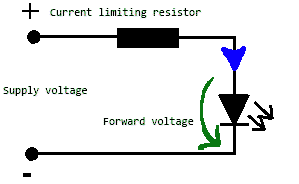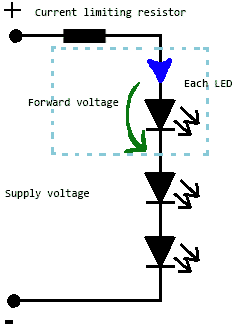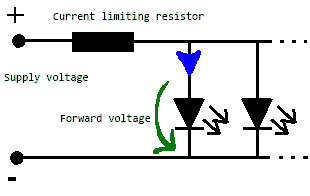Calculation of Current Limiting Resistor Value for LED Light Emitting Diode
Single LED circuit |
|
| Note: Different manufacturers and different colors have different voltage drops.
Red: 2.0-2.2v Yellow: 1.8-2.0v White: 3.0-4v Blue: 3.0-4v Green: 2.0-2.2v 3.0-3.2v The above is for reference only |
|
 |
|
LED series circuit |
|
 |
|
LED parallel circuit |
|
 |
|
What is the Calculation of LED Current Limiting Resistor Value?
The LED Current Limiting Resistor Calculator helps determine the appropriate resistor value needed to limit the current flowing through an LED. LEDs require a resistor to prevent excessive current, which can burn out the LED or reduce its lifespan.
The key formula is:

where:
- R = Resistor value (Ω)
- V_s = Supply voltage (V)
- V_f = Forward voltage of the LED (V) (depends on LED color)
- I_f = Desired current through the LED (A) (typically 10–20mA)
Why Use an LED Current Limiting Resistor Calculator?
- Prevents LED damage due to excessive current.
- Ensures consistent brightness by maintaining a steady current.
- Optimizes power efficiency by selecting the right resistor.
- Simplifies circuit design for beginners and professionals.
How to Calculate LED Resistor Value?
- Determine the supply voltage (Vs) (e.g., 5V from an Arduino, 12V battery).
- Find the LED’s forward voltage (Vf) (e.g., Red: ~1.8V, Blue: ~3.2V).
- Choose the desired current (If) (typically 10-20mA or 0.01–0.02A).
- Calculate the resistor value using:

- Select the closest standard resistor value (e.g., 220Ω, 470Ω).
When to Use the LED Resistor Calculator?
- When designing LED circuits for microcontrollers (Arduino, Raspberry Pi).
- While creating LED displays or indicator lights.
- When powering LEDs from different voltage sources.
- In troubleshooting brightness or overheating issues.